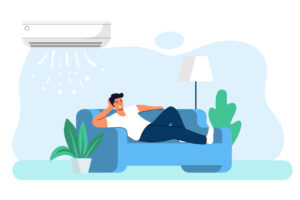Keeping your Aiken, GA, HVAC system running efficiently depends partially on having the right air filter. Read on to learn about six types of air filters and how to choose which will best meet your needs.
1. Pleated Filters
Regardless of the size filter you have, you’re most likely to see pleated styles when you’re looking for replacement options. Cotton or paper are common constructions for these filters, sometimes with wire mesh overlays.
The filtering media bends into a series of folds known as pleats. This process allows the filter a significantly larger surface area than the simple dimensions of the filter frame. In some cases, this is as large as 75 square feet.
2. Flat Spun Fiberglass Filters
Flat spun fiberglass filters come without pleats. You’ll recognize these as the blue or white flat filters you can pick up for usually just a few dollars.
These filters have little filtering surface area compared to their pleated cousins. This typically means they’ll offer a shorter filter life than pleated options, sometimes as short as 30 days.
Additionally, they commonly have the lowest MERV rating, or Minimum Efficiency Rating Value. This means it’ll let the most airborne contaminants into your system, which can restrict airflow and lower your indoor air quality. Nevertheless, this type of filter is better than no filter at all.
3. Electrostatic Filters
What if your filter could cause airborne contaminants to stick to it without restricting airflow in any way? This is precisely what electrostatic filters accomplish, with the filtering material creating a static charge as the air moves through.
These are generally more expensive than flat or pleated filters but will improve your air quality. Keep in mind, however, that they aren’t good at capturing some larger particles, like some spores.
4. HEPA Filters
HEPA stands for High Efficiency Particulate Air [filter]. This type of filter has a high MERV rating and can remove up to 99.97% of all airborne particles, though it requires a lot of draw to move air through it.
Most residential HVAC systems aren’t powerful enough to draw enough air to supply the system through a HEPA filter. However, they are perfect for commercial systems, like at a hospital or other medical facility.
Trying to use these filters on an inadequate system will strain the system. This excessive strain increases your utility costs and causes additional heating and AC repairs.
5. Washable Filters
Heat pumps sometimes come with washable filters rather than disposable paper, cotton or polyester filters. Additionally, you can find washable options for standard filter sizes in traditional HVAC systems.
If you opt for a washable filter, you’ll want to wash it frequently, sometimes as often as once a week. Furthermore, washable filters typically have a low MERV rating, meaning they won’t remove as many contaminants from the circulating air.
6. Beyond Media Air Filters
Media filters are the standard HVAC air filter that use some material to catch airborne contaminants. However, there are additional technologies that’ll help remove contaminants from the air.
Start by controlling your humidity, ideally keeping it between 30% and 50%, according to the Environmental Protection Agency (or EPA). Consider installing a system dehumidifier to easily control humidity throughout the entire house.
Additionally, you may want to invest in an ionizing air scrubber. These release negatively charged ions into the circulating air, which clump airborne contaminants together. Once enough collect in the air, they drop out as dust you can easily clean.
Choosing The Right Air Filters
To find the right air filter, start by checking the size needed, and the manufacturer recommended MERV rating. Next, consider if you need or prefer better air quality, or just the basic protection for your HVAC system.
Finally, think about the budget you have for replacing filters and how much maintenance you’re willing to handle. Depending on the filter you select, you may need to plan to check or replace them more often. Consider vacuuming them at least monthly to help extend their service life.
Make sure you have the best filters and devices to meet your air quality needs. Call to schedule your consultation with an indoor air quality expert from Doc Savage Heating & Air Conditioning, Inc today.
Image provided by iStock



